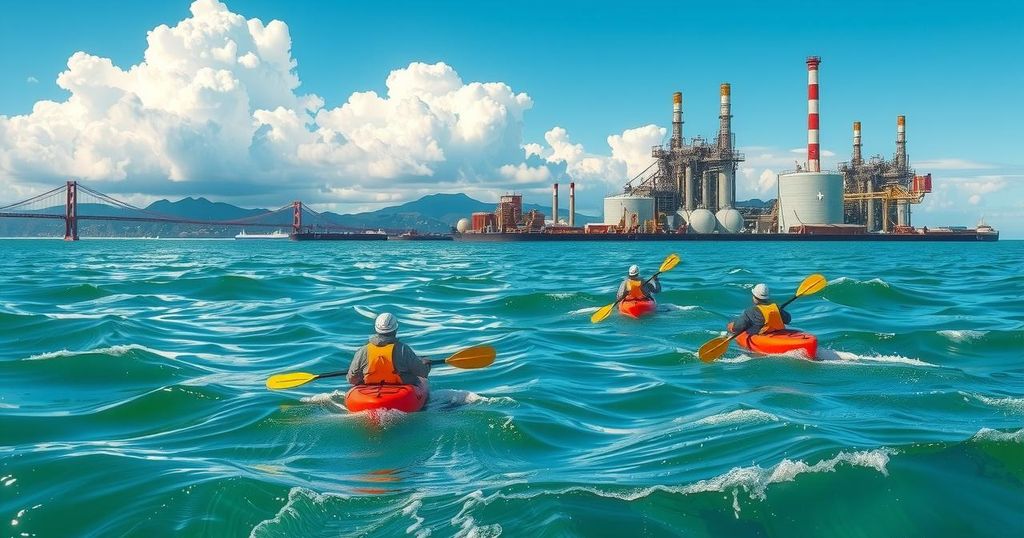California to Examine Oil Ties to Amazon Following Indigenous Pleas from Ecuador

Indigenous leaders from Ecuador visited California to call attention to issues stemming from the state’s consumption of Amazon oil. Their advocacy has driven the California Senate to introduce a resolution examining the state’s role in importing this crude. With Ecuador preparing to auction off new oil blocks on Indigenous land, the urgency for reassessment is apparent. This visit links the struggles of Indigenous rights with larger environmental concerns, spotlighting California’s responsibility in these matters.
RICHMOND, California — California is set to reevaluate its oil ties to the Amazon amidst rising concerns from Indigenous leaders in Ecuador. A delegation of these leaders traveled to the state, where they highlighted the dangers posed by expanding oil operations that threaten both their ancestral lands and the environment. Their visit earlier this week prompted the state Senate to introduce a landmark resolution urging officials to assess California’s role in importing crude oil from the Amazon.
The stakes are high as Ecuador prepares to auction off 14 new oil blocks that cover over 2 million hectares of rainforest, much of it located on Indigenous territory. This upcoming bidding round, named “Sur Oriente,” is provoking backlash from leaders who argue it contradicts a national referendum. This referendum, passed by Ecuadorians, sought a commitment to keep oil in the ground within Yasuni National Park, a vital area known for its biodiversity.
The connection between the Amazon and California is undeniably strong. Juan Bay, president of the Waorani people, called the delegation’s presence vital. He urged Californians to reconsider the origins of their crude. “This oil comes from Waorani Indigenous territory,” he stressed. Their kayaking journey through the San Francisco Bay showcased both environmental beauty and community collaboration — a message shared amidst the backdrop of Chevron’s refinery.
For Nadino Calapucha, a spokesperson for the Kichwa Pakkiru people, the experience was not just symbolic but resonated on a personal level. Spotting seals and birds during the excursion felt like nature itself welcoming them. He expressed the shared struggle between those in California and the Amazon, saying, “In the end, we feel that the struggle is the same.” California remains the world’s largest consumer of Amazon oil, refining substantial amounts for fuel as Ecuador stands as the main onshore crude producer in the region.
Highlighting a significant ruling from the Inter-American Court of Human Rights, Bay emphasized that Ecuador is failing to respect Indigenous rights. The court decreed that the government must stop oil extraction in protected areas, including Yasuni National Park, where an estimated 1.7 billion barrels of crude reside. Bay called upon California’s leadership to consider its ethical responsibility regarding oil imports that exploit Indigenous lands.
California State Senator Josh Becker commended the leaders for their courage and unwavering commitment to their land. “They are defenders of a living rainforest that stores carbon, regulates the global climate, and sustains life,” he remarked on the Senate floor. The Chevron facility in Richmond has long been a target for criticism from environmental justice advocates due to its role in processing millions of barrels of Amazon crude, raising alarms about pollution and public health risks.
As the visit reached its climax, the delegation collaborated with Amazon Watch, an Oakland-based non-profit, launching a report discussing climate and legal risks of operating in Indigenous territories without consent. Kevin Koenig, the organization’s director, voiced urgent concerns regarding California’s dependence on Amazon oil. He stated, “California has an addiction to Amazon crude,” and stressed the need for Californians to recognize their complicity in perpetuating demand which adversely affects the Indigenous populations and the environment.
Koenig warned that California’s fate is intertwined with the Amazon’s health. As the rainforest plays a central role in climate regulation, its degradation only heightens California’s vulnerabilities to natural disasters. He advocated for stronger climate action and a significant reduction in crude oil reliance linked to human rights violations and environmental harm. The resolution to address these critical issues will likely be voted on within the coming weeks, marking a pivotal moment in California’s energy policies and ethical stance regarding its energy sources.
The significance of this movement cannot be overstated as it not only paves the way for potential reforms but also acknowledges the struggles of Indigenous communities in their fight for rights and environmental preservation.
California is under pressure to reconsider its oil imports from the Amazon following a visit from Indigenous leaders from Ecuador. Their call to action highlights serious concerns about the environmental implications and the rights of Indigenous populations affected by oil drilling. A resolution prompting this examination was introduced in the Senate, which could lead to significant changes in state policy. As California navigates its energy future, the implications for both local and international communities are substantial, highlighting a necessity for ethical engagement with resources tied to exploited territories.
Original Source: apnews.com







